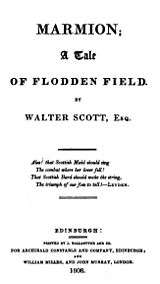Marmion (poem)

Marmion is an epic poem by Walter Scott about the Battle of Flodden (1513). It was published in 1808.
Scott started writing Marmion, his second major work, in November 1806. When Archibald Constable, the publisher, learnt of this, he offered a thousand guineas for the copyright unseen. William Miller and John Murray each agreed to take a 25% share in the project. Murray observed: "We both view it as honourable, profitable, and glorious to be concerned in the publication of a new poem by Walter Scott." Scott later said that he thoroughly enjoyed writing the work. He told his son-in-law, Lockhart, "Oh, man, I had many a grand gallop among these braes when I was thinking of Marmion."
In 1807 Scott practised manoeuvres with the Light Horse Volunteers (formed to defend an invasion from France) in order to polish his description of Flodden. Marmion was finished on 22 January and published on 22 February 1808 in a quarto first edition of two thousand copies. This edition, priced one and a half guineas, sold out in a month. It was followed by twelve octavo editions between 1808 and 1825.
Plot
The poem tells how Lord Marmion, a favourite of Henry VIII of England, lusts for Clara de Clare, a rich woman. He and his mistress, Constance De Beverley, forge a letter implicating Clara's fiancé, Sir Ralph De Wilton, in treason. Constance, a dishonest nun, hopes that her aid will restore her to favour with Marmion. When De Wilton loses the duel he claims in order to defend his honour against Marmion, he is obliged to go into exile. Clara retires to a convent rather than risk Marmion's attentions. Constance's hopes of a reconciliation with Marmion are dashed when he abandons her; she ends up being walled up alive in the Lindisfarne convent for breaking her vows. She takes her revenge by giving the Abbess who is one of her three judges documents that prove De Wilton's innocence. De Wilton, having returned disguised as a pilgrim, follows Marmion to Edinburgh where he meets the Abbess, who gives him the exonerating documents. When Marmion's host, the Earl of Angus is shown the documents, he arms De Wilton and accepts him as a knight again. De Wilton's plans for revenge are overturned by the Battle of Flodden. Marmion dies on the battlefield, while De Wilton displays heroism, regains his honour, retrieves his lands, and marries Clara.
Reception
Although the book was a huge and lasting commercial success in both Britain and the United States, it did not find favour with contemporary critics. The introductory letters to Scott's friends, which open each canto, were dismissed as unwarranted intrusions. A hero as flawed as Marmion was also unwelcome at this time and the story was criticised for its obscurity. Francis Jeffrey published a particularly harsh review in the Edinburgh Review. Jeffrey observed that much of the verse was 'flat and tedious'; he accused Scott of simply showing off his historical erudition. He also objected to the anachronism of the chivalric code and opposed the warlike sentiments of the introductory epistles. Ultimately, however, the public enthusiasm for Scott's work was undimmed and the poem remained popular for over a century.
The stanzas telling the story of "young Lochinvar", excerpted from Canto V, particularly caught the public imagination and were widely published in anthologies, and learned as a recitation piece.
One of the most quoted excerpts from Scottish poetry is derived from Canto VI, XVII:
- Oh, what a tangled web we weave
- When first we practise to deceive!
Felicia Hemans used two lines from Marmion as an epigraph for her poem of 1827, The Homes of England.
- Where's the coward that would not dare
- To fight for such a land?
Cultural references
In the noir film I Wake Up Screaming (1941), Ed Cornell (Laird Cregar) sarcastically compares Frankie (Victor Mature) to young Lochinvar:
- — You've taken Jill. She hasn't got anything to do with this. Let her go, and I'll give myself up.
- — (Chuckling) You've turned into quite the young Lochinvar, haven't you? Self-sacrifice and everything.
In Jane Eyre by Charlotte Brontë "Marmion" is quoted. The heroine reads the poem towards the end of the book.
Bibliography
- Scott, Walter. Marmion: A Tale of Flodden Field (Edinburgh: Printed by J. Ballantyne and Co. For Archibald Constable and Company, Edinburgh; and William Miller, and John Murray, London, 1808).
- Scott, Walter. Marmion: A Tale of Flodden Field (London: A. W. Bennett 1866). [Ill. with 15 mounted original albumen photographs of Scottish scenery by Thomas Annan].
External links
| Wikiquote has quotations related to: Marmion |
- Marmion at Project Gutenberg
- Marmion at Archive.org
-
 Marmion public domain audiobook at LibriVox
Marmion public domain audiobook at LibriVox